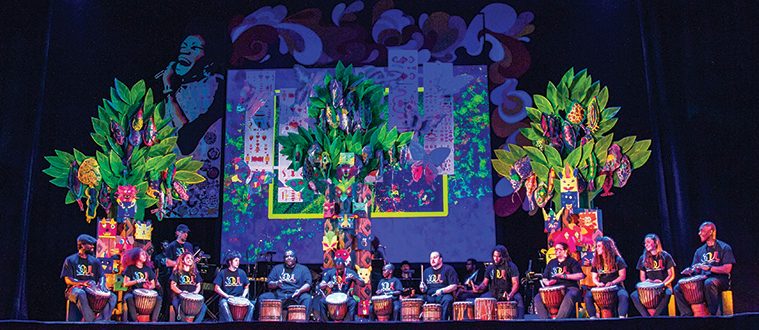On May 25, 2017, the Beverly-based nonprofit organization Express Yourself put on its 23rd annual performance. Known around the studio as “The Show” (the mention of which causes Express Yourself’s team members to get nostalgic and anxious), the event functions as the culmination of another year’s hard work for the team and their students. The Show, which for over a decade has been held at the Boch Center–Wang Theatre in Boston (drawing a crowd of around 2,000 people), brings over 200 at-risk youths together for a capstone performance—a celebration and a showcase of visual and performing arts. Think of it as a musical, a dancing collage, a splendor for the senses, which you, as an audience member, are a part of.
The work with the students begins in mid-September, allowing them some time to settle back into their academic routine. Right from the start, the work for the following year’s show gets underway. But rather than immediately start rehearsing a dance for a performance that’s eight months off, the kids paint. And this is not simply an abstract piece that will get stuck on mom’s fridge—the Express Yourself participants, whether they are conscious of it while their brush is leaving another tangle of teal or not, are creating set pieces for the upcoming show. The art they create from the get-go will be on display for that massive audience some eight months down the line.
And that is one of the most beautiful parts of the whole enterprise: the seamlessness of it. Of course, before the kids begin to pour back into Beverly’s Cummings Center studio—a big open space filled with the tools to foster any sort of artistry—the Express Yourself team has everything planned. The theme for each show is chosen (this year’s was SOUL, denoting both the musical and metaphysical varieties); the set pieces are partially assembled; and a soundtrack has been or is being built. That seamlessness provides the students with stability and comfort, and a group of people supportive enough to get them on stage in front of 2,000 people and dance—which is tough business for any child, let alone a traumatized child or a child suffering from mental illness—as well as a place from which they can comfortably express themselves.
At the head of all the planning and organization are Paula Conrad and Stan Strickland, the co-executive directors of Express Yourself. The two initially met at Lesley University, where Paula had Stan as a professor. Paula founded Express Yourself in 1988, which at the time was putting on small performances in the lobby of the Wang Theatre. Seven years later, Stan joined the team, and the two pushed the organization to where it is today: a nationally recognized nonprofit sponsored by the Department of Mental Health.
The phrase “moving from alienation to belonging” appears frequently in Express Yourself’s literature. It is, of course, a goal every human pushes toward. It is safe to say, though, that a sense of belonging is harder for some people. The youths that Express Yourself brings in are such people. Children who have been abused, abandoned, those dealing with mental health issues—these are the youths Express Yourself focuses on. Art is all about individuality and expression, and year after year, the organization turns those individual acts of expression into something collaborative. The children dance and sing and paint the same pieces together. They are, at all times in the studio, able to look in any direction and find someone who is striving toward the same goal, and, in the best way, able to know that same person is dealing with similar issues inside. And here in the studio, through that recognition (of self, of struggle, of overcoming, of happiness), their differences become mitigated. That is, of course, empathy, and empathy, in turn, fosters unity.
Express Yourself cannot hold on to their children forever, though, as much as they would like to. Most of them will be back next year, but some won’t. So, for now, in the studio, they provide the kids with a safe place to work and to feel at home, which is invaluable for them, because oftentimes these children lack a sense of (and sometimes a literal) home. Here in the studio, and later on stage, they have and will have it—that sense of home, and that most essential of unities: family.
Express Yourself

